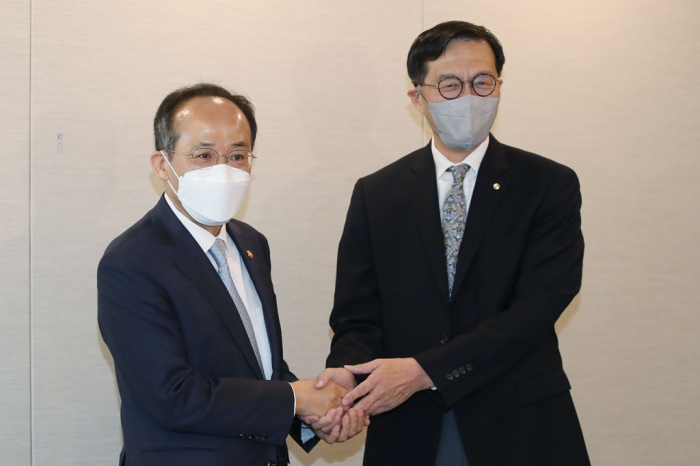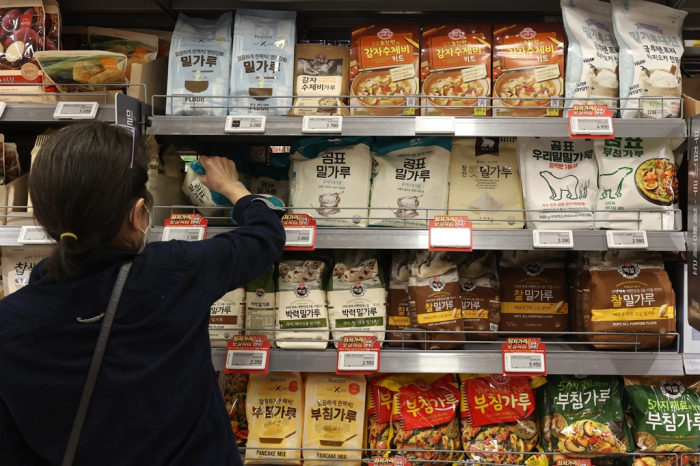Central bank
BOK chief says big-step rate hikes possible; bond yields jump
South Korea’s central bank is, however, unlikely to follow the Fed's tightening, allowing the interest rate premium to become a discount -- analysts
By May 16, 2022 (Gmt+09:00)
3
Min read
Most Read
LG Chem to sell water filter business to Glenwood PE for $692 million


Kyobo Life poised to buy Japan’s SBI Group-owned savings bank


KT&G eyes overseas M&A after rejecting activist fund's offer


StockX in merger talks with Naver’s online reseller Kream


Mirae Asset to be named Korea Post’s core real estate fund operator



South Korea’s central bank chief said he will consider big-step interest rate hikes in the coming months to curb inflation in Asia’s fourth-largest economy, sending government bond yields sharply higher on Monday.
Bank of Korea Governor Rhee Chang-yong said he will mull larger-than-usual interest rate increases, depending on data to be released in July and August.
“Data is uncertain in Korea to rule out the possibility of a big-step hike,” Rhee told reporters after a meeting with Finance Minister Choo Kyung-ho.
“We will have to see how inflation and growth will change,” Rhee said when asked by reporters whether the central bank was considering a rate hike of 50 basis points (bps) at its meeting later this month. “We have to watch the May policy meeting and changes in the economic situation and inflation in July and August.”
It was the first time for Rhee, who will chair his first policy meeting on May 26, to mention a big step. The BOK usually adjusts the base interest rates by 25 bps. Last month, Rhee had said South Korea does not need such aggressive tightening, adding the BOK has been raising borrowing costs since August last year.
Government bond yields advanced across the board after his latest hawkish comment with the highly liquid three-year debt yield up 13.5 bps to 3.046%, according to the Korea Financial Investment Association.
INFLATION
Rhee’s remark came amid growing expectations that inflation may top even 5% given the ongoing war in Ukraine, which had been expected to finish earlier. The global supply chain remained disrupted as major Chinese cities have been locked down due to a resurgence in COVID-19 cases there.
Global food production was predicted to significantly decrease on droughts and floods. India, the world’s second-largest wheat producer, banned exports of the crop on May 14. Global wheat supply has already been short due to plunging shipments from the Black Sea after Russia’s invasion of Ukraine.

Those factors are likely to further push up South Korea’s consumer prices, which soared 4.8% in April, the fastest pace since the 2008-09 global financial crisis.
A senior BOK official played down Rhee’s remark, saying “he merely emphasized that the uncertainties related to inflation are very high over the next three to four months.”
Analysts added Rhee made such a hawkish comment to support the ailing won currency. The South Korean unit opened the local trade up 0.6% at 1,277 against the dollar after his remarks, although it gave up most of its earlier gains after sluggish Chinese retail sales and industrial output data boosted concerns over a slowdown in the world’s second-largest economy and South Korea’s top overseas market.
STRATEGIC REMARK
The BOK is, however, unlikely to take such an aggressive move, analysts predicted.
“He seemed to make a strategic remark to quell inflation rather than emphasizing the need for a big step,” said Moon Hong-cheol, an economist at DB Financial Investment, adding the BOK already ramped up its policy rate to 1.5%.
HI Investment & Securities’ chief economist Park Sang-hyun also said South Korea is not in a situation that requires an aggressive interest rate hike similar to the US Federal Reserve’s monetary policy tightening.
“That seemed to reflect the government’s idea of stabilizing prices as a priority,” Park said, referring to Rhee’s comment.
The Fed’s big-step move means South Korea’s interest rate premium over the US will disappear or could soon become a discount.
Rhee indicated he would allow South Korea’s rate premium to become a discount.
“It is true that prices in South Korea are high, but not as much as in the US,” said Rhee. “We must look at growth and inflation comprehensively rather than carrying out a policy only with interest rate differentials in mind.”
South Korea’s interest rate premium is expected to become a discount as early as July, analysts said as the Fed is predicted to increase its benchmark overnight interest rate by half a percentage point each in June and July.
Earlier this month, the US central bank set its target federal funds rate to a range between 0.75% and 1%. If the BOK maintains the base interest rate once in May or July, South Korea’s rate premium will become a discount.
Write to Mi-Hyun Jo and Do-Won Lim at mwise@hankyung.com
Jongwoo Cheon edited this article.
More to Read
-
 EconomyWeakening won: A double-edged sword for the Korean economy
EconomyWeakening won: A double-edged sword for the Korean economyMay 15, 2022 (Gmt+09:00)
4 Min read -

-
 EconomyKorea April inflation hits 13-1/2-year peak; bond yields up
EconomyKorea April inflation hits 13-1/2-year peak; bond yields upMay 03, 2022 (Gmt+09:00)
2 Min read -
 Central bankBOK unexpectedly hikes interest rate as inflation accelerates
Central bankBOK unexpectedly hikes interest rate as inflation acceleratesApr 14, 2022 (Gmt+09:00)
2 Min read
Comment 0
LOG IN


